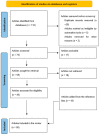Urinary Tract Infections in the Kingdom of Saudi Arabia, a Review
- PMID: 37110375
- PMCID: PMC10145783
- DOI: 10.3390/microorganisms11040952
Urinary Tract Infections in the Kingdom of Saudi Arabia, a Review
Abstract
Urinary tract infections (UTIs) are among the most common infections and are associated with an increased rate of antimicrobial resistance in Saudi Arabia. Better knowledge of the most common pathogens and their antimicrobial resistance patterns will be useful for creating new treatment guidelines. PubMed, Web of Science, Scopus, and Google Scholar were searched using suitable keywords to identify UTI publications until November 2022. Eligible studies were selected and analyzed. A total of 110 records were found, but only 58 articles were analyzed. Most studies were retrospective, and just a few were cross-sectional or prospective. The majority of the studies were conducted in the central region followed by the Eastern region. Escherichia coli and Klebsiella spp. were the most common pathogens. There was a significant resistance rate against co-trimoxazole and ciprofloxacin. On the other hand, amikacin was one of the most effective antibiotics. Overall, only a few studies have been published on UTIs in Saudi Arabia. Moreover, not all regions have been represented, so the full scope of the issue is unknown. UTIs are still a major problem, and resistance has developed against commonly used antibiotics. Thus, large epidemiological studies are needed to battle the rapid emergence of antimicrobial resistance.
Keywords: KSA; Saudi Arabia; UTI; urinary tract infections; uropathogens.
Conflict of interest statement
The authors declare no conflict of interest.
References
-
- Alrashid S., Ashoor R., Alruhaimi S., Hamed A., Alzahrani S., Al Sayyari A. Urinary Tract Infection as the Diagnosis for Admission Through the Emergency Department: Its Prevalence, Seasonality, Diagnostic Methods, and Diagnostic Decisions. Cureus. 2022;14:e27808. doi: 10.7759/cureus.27808. - DOI - PMC - PubMed
Publication types
LinkOut - more resources
Full Text Sources
Miscellaneous


